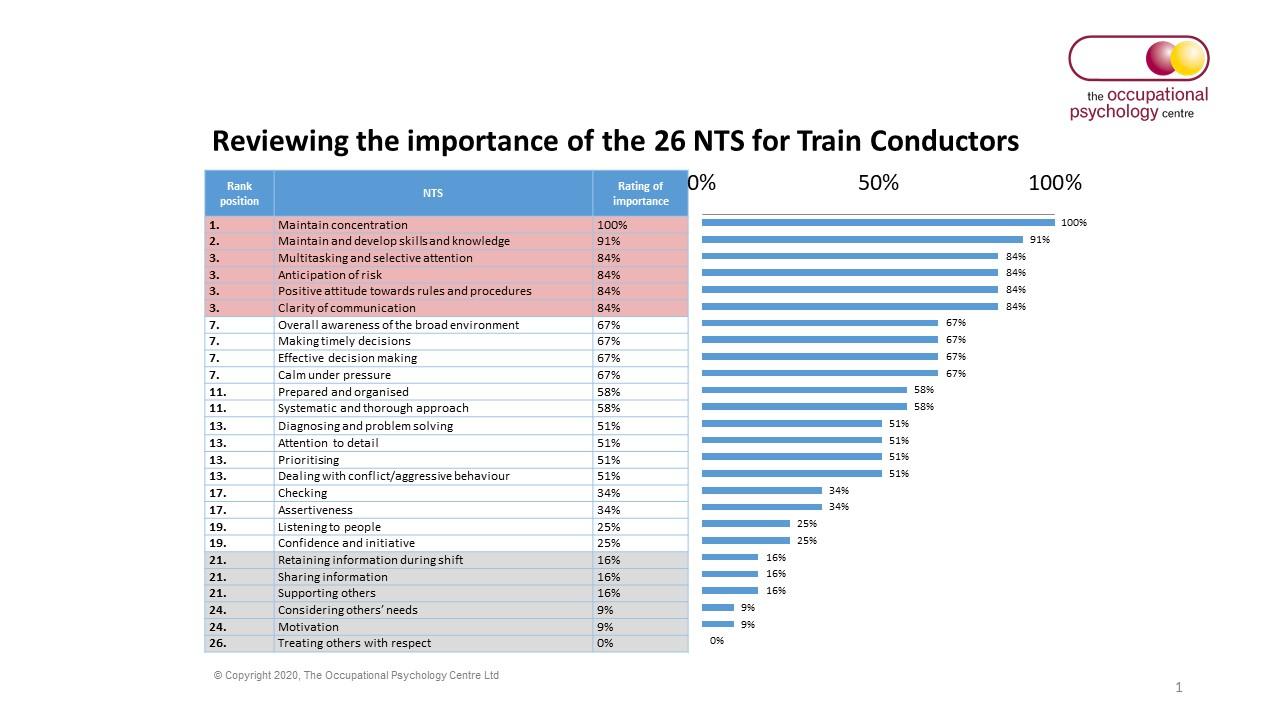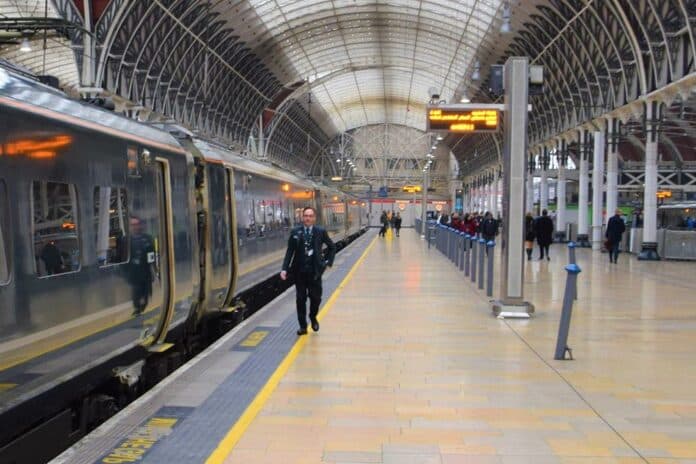3 of 8 – What NTS are most important to Train Conductors?
Dr Stephen Fletcher, occupational psychologist and director at the OPC, has written the third in the series of 8 articles about NTS. This article specifically explores NTS in relation to a Train Conductor’s role – the first article exploring NTS in the context of a specific job role. Further articles in the series aim to cover how we can use NTS to help identify root causes of safety incidents as well as identifying NTS shortfalls through safety incident investigations; the individual application of NTS in various driver roles and using NTS within driver training.
Train Conductors importance in managing safety
Train conductors in the UK play an important role in managing the safety of their trains. The role of train conductor varies across different train operators. Some will just undertake a safety critical function (sometimes referred to as a train guard), whilst others will undertake retail duties too, including ticket checking and customer service. For those who undertake safety critical tasks in their onboard roles, Non-Technical Skills (NTS) will play an important part in helping them undertake their jobs safely and effectively. There is a plethora of different NTS that could be relevant to the train conductor role, but a key question is what NTS are most important to train conductors?
OPC work with Conductor Managers to identify key NTS
OPC psychologists worked with a major UK train operator to help identify the NTS that are most important to its train conductor role. Job experts – Conductor Managers, with in-depth knowledge of the train conductor role were asked to rate the importance of the 26 NTS to the role. OPC psychologists then analysed the data and rank ordered the NTS in order of importance. The results are shown in the graph below:

A summary of the results
Whilst these results are from one UK train operator and a small group of job experts, they do provide interesting findings.
The results from our job experts indicated that the NTS of ‘maintain concentration’ was most important. Train conductors need to stay focused during all their activities including train dispatch tasks or managing an emergency. Avoiding incidents to protect others, themselves and the infrastructure is the number one priority.
The second highest ranked NTS with over 90% of our job experts agreeing was ‘maintain and develop skills and knowledge’. For some train operators the role of train conductor is evolving and changing and so there is a need for conductors to adapt and develop their skills and knowledge. We think it is also very important to see our train conductors constantly improving and honing their skills and performance over time to be the best and safest they can be.
There were 4 other key NTS that were identified as all equally important to the role of a Train Conductor, with 84% of our job experts all expressing the same opinion.
- ‘Mult-tasking’ was identified as the joint third most important NTS. Train conductors may at times attend to a number of demands all at once and they need to do so safely and effectively. As conductor roles can have varying degrees of interchangeable activities e.g. despatching the train, customer enquiries, liaising with the driver and or control alongside retail ticket sales, the ability to switch between tasks without impacting overall safety is very important.
- The NTS of ‘anticipation of risk’ was also ranked the third highest. The OPC recognises this as an essential NTS for safe and effective performance. Over the years, we have conducted many Post Incident Assessments (PIA) and they have revealed that prior to incidents some train conductors were at heightened risk, but the risk wasn’t effectively managed, which may have contributed to the safety incident. The NTS of ‘anticipation of risk’ is all about managing the situation rather than the situation managing you! Train drivers, conductors and crew alike can forward think, plan or be aware of potential risks or mitigating circumstances – therefore avoiding an incident. The OPC have specifically designed and launched a new personality test the Risk Anticipation and Time Focus Questionnaire (RTQ) to assess for this NTS. This new assessment tool can be a powerful means of developing existing train conductors and helping in the recruitment of new employees.
- The NTS of ‘rule following’ and ‘clarity of communication’ were also rated as 3rd equally important for train conductors – both are significant for the safe management of the train. We need our train conductors to adhere to rules and regulations at all times despite time, situation or people pressure. They also need to communicate clearly and effectively with others whether attending to retail duties, undertaking safety duties or dealing with an emergency.
NTS can be used and applied throughout the employee life cycle of train conductors to help improve safety and job performance. For example, they can be used to enhance the selection process for those undertaking train conductor duties. They can also be incorporated into training for both new recruits and existing employees. OPC Assessment has a large range of online and paper and pencil assessment tools that can help instil effective NTS into day-to-day roles, supporting train operators in the building of safe and effective train conductor teams.
Dr Stephen Fletcher emphasised: “In the rail industry there has been a heavy focus on NTS application for train drivers. However, many train operators are realising the importance of NTS for other safety critical roles too including that of Train Conductors. There is more key work to be done here. This research demonstrates how important NTS are to safe and effective performance of train conductors and the contribution of NTS to keeping themselves, train passengers and crew, and the infrastructure safer.”
If you would like to know more about NTS or how they can be used with train conductors or other safety critical roles, then contact us at admin@theopc.co.uk or call us on 01923 23 46 46.
Click here to read article 1 of 8
Click here to read article 2 of 8
Photo credit: iStock
For today’s rail news from railbusinessdaily.com click here.








































 0113 2082620
0113 2082620 info@railbusinessdaily.com
info@railbusinessdaily.com 15 Mariner Court, Wakefield WF4 3FL
15 Mariner Court, Wakefield WF4 3FL

